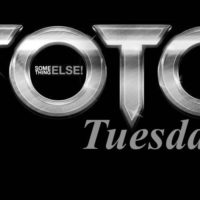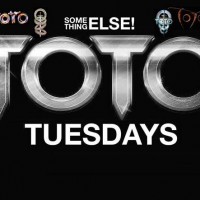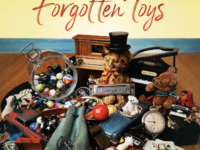Released on April 8, 1982, Toto IV was an unlikely mega hit, and it was a long time coming. The album recalls a time when record labels had faith in bands and invested in their longevity and artistry.
Toto’s fourth album represented a major investment for Columbia Records after 1979’s Hydra and 1981’s Turn Back failed to reach the heights of the band’s debut — both artistically and commercially. While each of those earlier studio efforts had overarching themes which were not fully realized, the foundation of Toto IV was similar to that of their 1978 self-titled debut – with a very satisfying mixture of styles, vocalist and familiar themes.
The result was a multi-platinum, multi-Grammy winning success. Wondering where to start? Here’s a look back at the five best songs on Toto’s best album:
“ROSANNA”
“Rosanna,” the leadoff single, is a perfect blend of the best Toto elements. The David Paich composition starts with a powerful shuffle from Jeff Porcaro, which was heavily influenced by Led Zeppelin drummer John Bonham’s performance on the song “Fool In the Rain.” Porcaro also adds elements from Bernard Purdie’s work on the Steely Dan song “Babylon Sisters.”
The basic track for “Rosanna,” like all the songs on Toto IV except “Africa” was recorded live by Al Schmitt. The famed engineer was able to capture every nuance in the band’s playing. The tambourine, David Hungate’s thumping and the congas all sound vivid and alive. The interaction between Jeff Porcaro, David Hungate, David Paich and Steve Lukather produced inspired rhythm tracks. The songs were all produced by Toto, but Paich took the lead in casting the song which featured joint lead vocals by Steve Lukather and Bobby Kimball.
One of the most intricate parts on the album is the synthesizer solo section after the second verse, which was arranged and played by Steve Porcaro over sessions that were rumored to have taken several days. Additionally, the song contains a piano solo at the end by David Paich and two overdubbed guitar solos. Steve Lukather’s solos for the album and many of his guitar parts were overdubbed, while he played live with the rhythm section for the basic tracks.
Jerry Hey was brought in to arrange the moving horn parts, which featured James Pankow of Chicago on trombone, and Jim Horn and Tom Scott on saxophone, in addition to Hey on trumpet. Additionally, the sonic scope of Toto’s “Rosanna” was enhanced by Tom Kelly on background vocals, and Lenny Castro on congas.
The overdubbed parts were brilliantly captured in the mix by Greg Ladanyi. He and Schmidt shared a Grammy award for best engineered album in 1982. “Rosanna,” which went to No. 2 on the singles chart in the U.S., also won for instrumental arrangement for vocals and vocal arrangement a Grammy for best record and Toto won for producer of the year. How’s that for a comeback story! – Preston Frazier
“MAKE BELIEVE”
For years I had a bit of an anti-Toto IV bias, because it was so successful it got a bit played out compared to other Toto albums. I gravitated more toward the rest of the band’s catalog, which often got lost in the shadows, so to speak.
In recent years, I’ve kept my ears a bit more open and come to appreciate the reason Toto IV was so overplayed: It was and is such a stellar album. While some of the songs are better than others, even the weakest of the material on the album would be the best of the material on albums by lesser bands.
Being the youngest of six kids, my musical tastes have always gravitated towards the late ’70s and early ’80s. By the time Toto IV was released, there were only two of us kids left living at home. I was in kindergarten and the youngest of my older brothers was a senior in high school. He was a devotee of Columbia House (as I was a handful of years later) and some of the musical selections that found rotation on his stereo included Chicago 16, Chicago 17, and Toto IV. I only mention Chicago because I gravitated to their use of horns, so the material on Toto IV that featured horns caught my ear before the rest of the album.
“Make Believe” has catchy lyrics, a solid groove, features some of Bobby Kimball’s best vocals of either of his tenures in Toto, and to top it all off for this lover of horns in rock: It has some killer sax playing by Jon Smith. “Make Believe” was one of the reasons I longed for the day to see Toto and Chicago tour together. How great would it have been to hear Walt Parazaider (or even his longtime stand-in Ray Hermann) tackle this gem?
I’m not generally a fan of Bobby Kimball’s vocals. I’ve always gravitated more towards Joseph Williams and the late Fergie Frederiksen. Still, I’d argue that “Make Believe” is probably a favorite of all the Kimball-sung songs — second only to “You Are the Flower.” His vocals dance around Smith’s sax and Jeff Porcaro’s solid groove. When you toss in the vastly different keyboard stylings of David Paich and Steve Porcaro, it blends together as an example of how a well-crafted pop song should sound. – Perplexio
“I WON’T HOLD YOU BACK”
On my often-changing list of the world’s greatest living guitarist, there is usually a bunch of Steves in or near the Top 5. Sure, Steve Howe, Steve Morse and Steve Hackett have all have great chops, written great songs and had multifaceted careers — but none of my Steves have the vocal chops of Toto guitar-great Steve Lukather.
Lukather has long been the go-to guy for Toto ballads. While Bobby Kimball and David Paich (and to a lesser extent Steve Porcaro) have contributed fine vocals on ballads, at this point in the band’s history Lukather had made the bigger impression as a ballad singer. Also up until Toto IV, a vast majority of the ballads — or, for that matter, any song — had been written by David Paich. “I Won’t Hold You Back” changed the paradigm for the band.
Not only does Lukather write the music and lyrics, but his vocals help make the last charting single from Toto IV a No. 10 pop hit. Lukather has said he initially did not want the ballad released as a single — he preferred the rocker, “Afraid of Love” — but it’s easy to see why “I Won’t Hold You Back” has had such staying power.
The David Paich piano intro is elegant yet simplistic. Lukather’s vocals are earnest and tender, and supported by subtle acoustic guitar. The Hungate/Porcaro rhythm section is supportive and not predictable. When the first chorus is reached, the drums ratchet up the tension with orchestrated fills over descending piano arpeggios. The group-produced track also adds a new element with Eagles bassist Timothy B. Schmidt’s backing vocals being multitracked as the sole support to Lukather.
At the end of the chorus, it’s clear Toto has gone full throttle with the orchestra — as strings, French horns and glockenspiel add nuanced accents. The buzz roll of Jeff Porcaro’s snare drum introduces the second verse but, for the repeat of the chorus, the orchestra and drums build to a crescendo. The guitar solo section is pure magic: Lukather’s solo is simple yet perfect, and the orchestration by David Paich (with assistance from his father Marty Paich, and conducting by James Newton Howard) is breathtaking. There’s even a touch of Steve Porcaro synthesizer towards to the end of the final chorus.
It’s easy to see how the song shot to No. 1 on the Adult Contemporary charts in the U.S., and why the band won the producer of the year Grammy in 1983. – Preston Frazier
“AFRAID OF LOVE”
One of the conundrums when it comes to Toto is that so much of their music is consistently strong, so it can’t have been easy to determine which songs were and weren’t released as singles. There were the obvious of course: “Rosanna” and “Africa” both come to mind. But there were a handful of other tracks that would also have made worthy singles.
“Afraid of Love” is not only one of the best deep cuts off of Toto IV. It’s one of Toto’s catchiest, most accessible album tracks ever. Had the song been recorded for Turn Back, for example, I think it would have been the lead single release for the album. The same could be said for Hydra.
Indeed, the “misfortune” of “Afraid of Love” that likely kept it from being released as a single was that it was on one of Toto’s strongest studio efforts.
Between Steve Lukather’s driving guitar and the catchy melody, this song does seem to have “hit single” written all over it. In keeping, “Afraid of Love” was a live staple for several years — and thankfully reappeared on Toto’s setlist in 2015 after being absent for several years.
Every time I listen to it, I can’t help but believe that whoever made the choice to not release “Afraid of Love” missed an excellent opportunity to rack up yet another hit single for Toto. Then again, Toto already owned the Grammys that year. Another win or even nomination might have pushed them into “over-saturation” territory. – Perplexio
“AFRICA”
“Africa,” the last song on Toto IV, represents an end in many respects for the band.
Original Toto bassist David Hungate completed his initial tenure with a dramatic flourish, leaving the studio and – until the tour in support of Toto XVI, anyway – never looking back. Unbeknownst to his bandmates, Hungate had moved his wife and newborn son to Nashville prior to the recording of Toto IV. When asked to meet in the band’s rehearsal space to prepare for an extended tour, Hungate declined. He also did not appear in any of the Toto IV videos.
Meanwhile, Kimball also saw his initial tenure conclude with this LP. His vocal harmonies and chorus parts blended seamlessly with Lukather’s and Schmit’s backing vocals on “Africa,” but was fired after the Toto IV tour.
Hungate’s innovative bass and Kimball’s harmonies are just two of the elements that transformed “Africa” into a signature song for Toto.
Jeff Porcaro’s loop integrated with Lenny Castro’s conga created one of the most memorable drum parts in rock history, and earned Porcaro a cowriting nod. The rhythm signature, which seems somewhat similar to that later used on the Donald Fagen’s “The Goodbye Look,” also served as the bed for which Joe Porcaro lays his marimba parts, and on which Paich places his Yamaha CS-80 Kalimba. Paich and Steve Porcaro seamlessly tie in their synthesizers, and sax legend Jim Horn employs a recorder to further enhance the sound.
Every piece of “Africa” works, and the Paich-sung lyrics reflect a youthful naïveté of the protagonist which makes the song an enduring classic. Try as they might, Toto would never sound like this again. Fortunately, they didn’t try to recreate the Toto IV formula on their 1984 follow-up Isolation. – Preston Frazier




